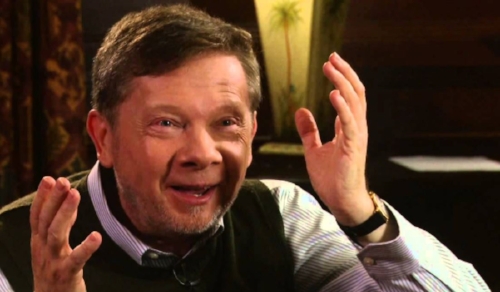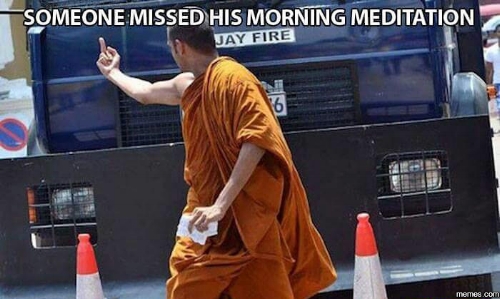Its time for presence giving!
‘Everyone is talking about presence these days and it's not even nearly Christmas! As mindfulness meditation becomes increasingly popular, people are starting to be introduced to the idea of presence. Mindfulness is about practising presence. I was talking to my girlfriend’s mother about this idea and she had the good sense to ask, “ but what does it actually mean to be present?” I was stumped as I tried to describe it. I kept fumbling around for the right words. Granted, she is Spanish with English her second language, but even without this barrier, I would have failed to clearly explain it. I know what it feels like it to be present as I have practised it in meditation. But unless you have experienced it yourself, it would be like describing the colour green to a blind person.
The 9th sense
To describe presence I said, “close your eyes and notice your feet on the ground”. This ability to notice the feet is actually one of your senses and its called proprioception. You can blame Aristotle for making you think that you only had 5 senses. Really you have somewhere between 9 and 33 senses and none of them allows you to see dead people.
Just FYI these extra senses included the sense of balance, the sense of stretch (including stomach, bladder, skin and muscle stretch) and plenty more.
What presence isn’t
My request to have her feel her feet was not even a good explanation of presence, it was just her using one of the lesser-known senses. You can be present when noticing a sound or a smell but if you are only focusing on that one thing then you have become fixated on it, and are no longer aware of all that is happening. It wasn’t until I spent a week in Verona, training to be a Holistic Counsellor, that I discovered what presence really was.
The landscape outside the course in Verona
While feeling your feet may not be exactly what ‘presence’ is, using the senses is a common way to come into the body and out of the head. This allows you to quieten your thoughts. The thinking mind is the most common obstacle to the present moment. When we are planning, replaying past events or worrying, we are not in the present moment, we are in the past or future.
If you were to take a look ‘under the hood’ of your brain when you are present you would see that your brain waves move from a fast-paced, high-frequency beta state to a slow speed alpha state. Beta brain waves are good for planning, taking exams, or awkward first dates. Alpha brain waves are the ones responsible for inner thought, creativity and the much sought after state of ‘inner peace’. Whilst neither state is better or worse, it is a problem in our society that we are spending too much time in an beta state. This is why we are seeing more and more people suffering from anxiety, insomnia and burn out.
Why do others want me to be present?
In the holistic counselling game, presence is seen to be so important to a client that my course dedicates the whole of the first week to the practice of it. Giving someone your full presence, whether as a counsellor or friend, is like the sun finally shining on the leaves of a flower. Only then does the flower start to blossom. We want presence and when we don’t get it, we suffer.
Have you noticed how difficult it is to talk to someone when you know they are not present? They may be nodding along, “ummm hmmming” away but you know they aren’t really interested in what you have to say. How does this make you feel? I know how much it irritates me.
There is a big difference between listening and waiting for your turn to talk.
The Art of Being Present
Module 1 is titled ‘The Art of Being Present’. And this is a good way to think of presence...as an art, not a science. Presence is something definable by the individual. No one is going to decide for you what good presence and bad presence is. It is something you practice and it evolves with time.
Why do I even want to be present?
Because being out of presence is suffering. Eckhart Tolle is probably the most famous proponent of the ‘present moment’ thanks to his book ‘The Power of Now’. The present moment gives you something that I can never get enough of: calm, peace, and an absence of worries about the future or regrets about the past. All of our problems, anxieties, traumas and fears only exist in our minds. Come out of the mind and into the present moment and these pesky things disappear. Wouldn’t it be nice to have all your problems disappear?
Tolle suggests:
Come into the present moment. Just be, and enjoy being. If you are present, there is never any need for you to wait for anything.”
“If you are in the habit of creating suffering for yourself, then you are probably creating suffering for others too.”
Here's Eckhart wondering why you're not listening to him.
Judging, interpreting and being clever.
On my course, I was lucky enough to be working with some highly sensitive and attuned students. These people can smell your fear like dogs. We had to give several counselling sessions to each other where we were observed by members of the group. This was nervewracking, especially as we had all dived very deeply into our emotions during the week and big things were coming up for people. The most common feedback I received from my counselling was that my pretend client could actually sense when I was in my head and not in my body. This made them feel unsafe, untrusting and even aggressive towards me. Imagine that, not being present actually made someone angry at me! When I think about it, it isn't that hard to imagine. I just remember the nodding “umm hmming” person I thought of earlier.
Many times during a counselling session I would go into my head so that I could think of the next clever thing to say, to fix or impress this client. And this is exactly where I became exposed! People don’t want to be fixed, they want your undivided attention shining on them as they fix themselves. This is the simplest and most generous thing you can do for someone. Give someone this gift and watch them expand.
How to be present
The easiest way to remain present for someone is to anchor yourself in your body. Point your attention to somewhere safe, like your feet or your legs. Then hold eye contact. We were advised to keep 60% of our attention within ourselves and 40% with the other. With practice, this state of presence becomes a meditation in itself. You can recharge as you rest in the present moment without having to do things for others. You are freed from the pressure to perform, the pressure to please, the pressure to do. You can simply be. Many people laughed at how simple a concept this was. We could be counsellors, being present for a client, allowing them to heal themselves, recharging, all while getting paid. It sounds like a big scam but is actually the perfect scenario for all parties.
Yes, of course, there’s research on the benefits
It wouldn’t be like me to post an article without some sciency stuff to back up the ‘woo woo’. Mindfulness meditation has received a great deal of research on its benefits. One such study from Brown University showed that people who practised mindfulness meditation demonstrated more pronounced alpha waves and greater attention to sensory details than those who did not practice. And the key part of this is that they experienced these things off of the meditation matt. They were able to carry their alpha waves with them into the real world.
Moving from doing to being
We are in a ‘doing’ society. Everything is about doing. We are bombarded with pressure to do, to create, to achieve. People (a.k.a.. me) have forgotten the importance of simply being. While it is useful to set goals and be productive, it is not useful to burn yourself out on production. You need a balance of rest and enjoyment if you really want to achieve. I can’t have one without the other. I can’t produce or ‘do’ unless I have allowed myself enough time to rest and ‘be’. And I cannot ‘be’ unless I have satisfied myself that I have done enough doing. No one is trying to tell you to go and spend the rest of your life in a Himalayan monastery meditating 14 hours a day. This is just about finding balance. The present moment is where I expect to find my balance.









